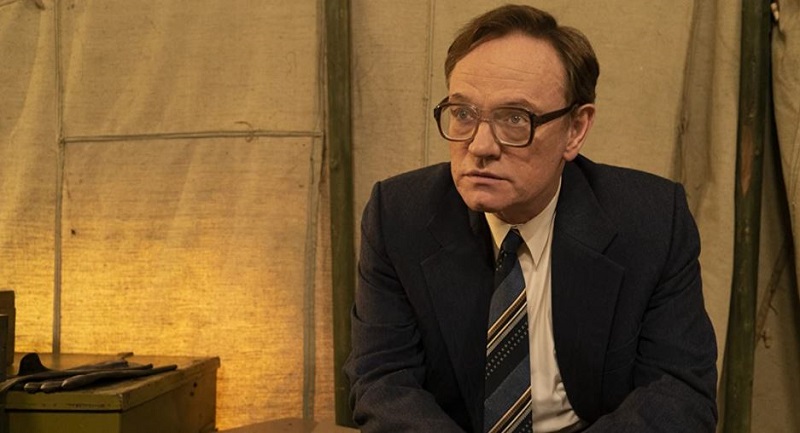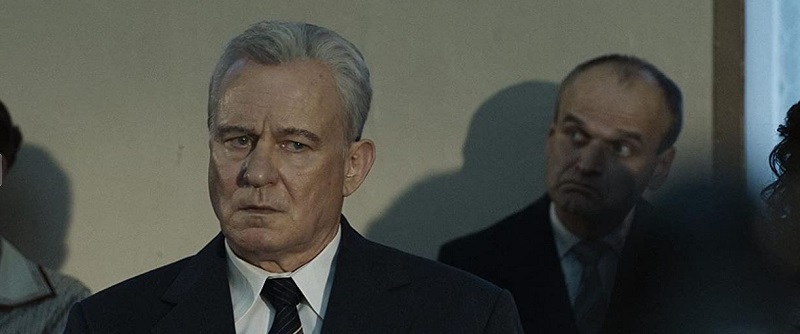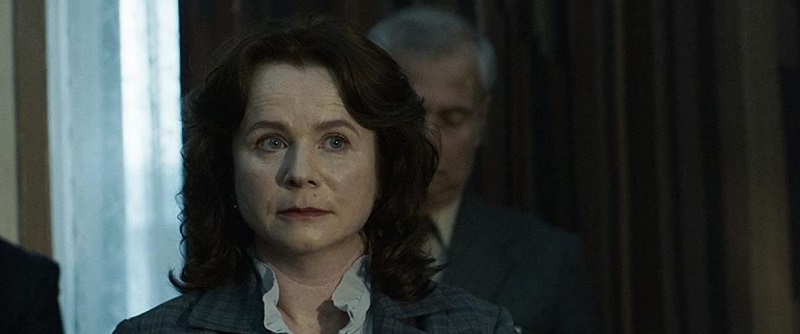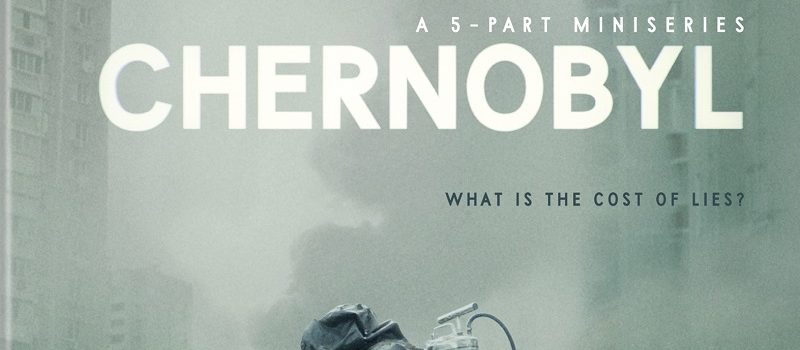One of the most stunning things to come out of the experience that is witnessing Chernobyl—the five-part miniseries from HBO—is the argument that the nuclear site accident/disaster is credited with creating the first cracks in the fall of the Soviet Union.

Now that Chernobyl is out on DVD, Blu-Ray, on-demand, and 4K Blu-Ray (the latter is what I was given by Warner Bros. Home Entertainment for free to review… the opinions I share are my own), there is no excuse for the entire planet to dive into this must-see slice of television.
In case you don’t know, the accident at the Chernobyl nuclear power plant in Russia was the worst atomic disaster in human history. As portrayed in the mini-series that bears its name, the scope of the health catastrophe is brilliantly laid out, all without showing too much of the actual suffering—which would feel gratuitous.
Not only was the accident itself worthy of the talented folks at HBO films chronicling what happened on April 26, 1986, but the cover-up that ensued. It’s fascinating to witness how, as a radioactive cloud descended on Europe and the rest of the globe, the Soviet Union couldn’t hide the truth anymore. There was no way that their insistence that what occurred at the nuclear power plant in the Ukraine was not the business of anyone but the Soviets. Up until that point, they insisted it was not a big deal, but it was a historically enormous kind of a big deal.
The cast of Chernobyl is sublime. The international ensemble clearly understands the importance of what the miniseries is portraying. They say that to ignore the past is to be doomed to repeat it. When someone like HBO produces a series as remarkable as Chernobyl, it is a living and breathing encapsulation of that past that makes it impossible to disregard. Then again, ignoring the warnings about a certain pandemic could be lumped into the pile of ignoring a public health emergency like the one that happened at the Russian power plant… but given who occupies the White House, that is a whole different article!
The fact that Chernobyl exists is an incredibly important first step in the lesson department in holding governments responsible for the protection of their citizenry.
Jared Harris is Valery Legasov, the scientist tapped by Soviet Union leader Mikhail Gorbachev to lead the immediate and subsequent short-term response to the disaster. When Legasov arrives on the scene, via helicopter, the horror in Harris’ eyes alone speaks volumes as to what it is that not only occurred but its longtime effect on the people of the area, as well as the natural world.
The ultimate tragedy… using a phrase such as “longtime effect” when speaking about nuclear accidents, the truth—in terms of quantifying a time period—is multiple lifetimes, numerous generations, and for the foreseeable and long-term future.
The Soviet Union had layers upon layers of folks whose entire existence was ensuring the truth that the government wants is the one that not only is reported but resonates. Legasov had an adversary in that department in the form of Soviet Deputy Prime Minister Boris Shcherbina (the always stellar Stellan Skarsgård). From that initial descent into the area surrounding the accident in the helicopter, it was clear that Shcherbina had a challenge on his hands.

Skarsgård portrays the reaction to witnessing the horror on their hands in a manner that befits his position in the Communist Party. His own eyes, coupled with the scientific reality coming from Legasov in an almost play-by-play fashion of what was occurring, would never jive with what the Soviet leadership sought to have been the narrative.
Witnessing the Swedish actor embrace that party line versus human cost is a gift to those who wound up being casualties of the Chernobyl disaster. As the HBO miniseries illustrates almost continually, there were countless souls on the ground who stepped into situation after situation that they knew would result in their death. And it would be a death that couldn’t be more uncomfortable and painful.
That is some of the most painful aspects of witnessing this human disaster unfold in the miniseries. The human toll was immense. After all, the Chernobyl accident put 400 times more radioactive garbage into the Earth’s atmosphere than the atomic weapon that the U.S. unleashed on Hiroshima.
But sometimes, tough stories need to be told. We cannot ignore what occurred at Chernobyl. The extent of its disaster is handled by series creator Craig Mazin with the most humane of touches, while simultaneously serving as an indictment of the nuclear power system employed by the Soviet government.

Chernobyl also features Emily Watson as Ulana Khomyuk. That character serves as a hybrid of a number of Russian scientists who worked with Legasov and Shcherbina. Not only does her presence help determine the man-made reason the disaster happened in the first place, but also gives the team on the ground the framework for how to move forward in the most efficient and humane way.
What basically would end up happening is an entire city had to be relocated—at least those who survived and didn’t succumb to radiation poisoning.
HBO is no stranger to producing films and miniseries that blow our collective minds. Chernobyl recalls Band of Brothers in that it is something that must be revisited every few years. The subject matter and the message gleaned from the filmmakers and performers alike is one centered around people toiling in the most inhumane of human moments making the ultimate sacrifice. By capturing it, the network has paid tribute to all who perished, but most importantly it is a salute to the human spirit.
The miniseries is a winner of an impressive 10 Primetime Emmy Awards and two Golden Globe Awards. Its ability to concurrently document the worst man-made catastrophes in history and how those on the ground were able to make the ultimate sacrifice to prevent Europe and those beyond those borders from sharing Russia’s deathly fate.

The Movie Mensch was able to review the visually and auditorily amazing 4K Blu-Ray of the miniseries, chock full of bonus features. It is a mesmerizing visual endeavor that pops off the screen.
There are the five, one-hour episodes: 1:23:45, Please Remain Calm, Open Wide, O Earth, The Happiness of All Mankind, and Vichnaya Pamyat. Then, there are the bonus materials that achieve the impossible—they enhance something that could stand on its alone as some of the most memorable television moments in the medium’s history.
Inside the Episodes are terrific featurettes that delve deeper into the making of each of the quintet of programming by offering some fascinating interviews from filmmakers and performers, as well as priceless behind-the-scenes footage.
What is Chernobyl? does a decent job of giving us a 98-second, brief, history lesson about what exactly occurred at the nuclear site. Meet the Key Players is a nice featurette that puts the spotlight on Harris, Skarsgård, and Watson.

Lastly, there is a terrific trio of quick, but informative looks at a different element of the production. Behind the Curtain finds director Johan Renck getting the spotlight. Script to Screen – The Divers shines a light on some of the lesser-known souls who are key to this true tale. Finally, and most fascinatingly, Pivotal Moment: The Trial is able to put the entire thing in perspective due to the nature of how there was a trial centered around the handling of the disaster and the response of the Soviet government. It, surprisingly, provides the unlikeliest ray of hope in what many could think is a hopeless story.
In hindsight, I don’t find Chernobyl a bleak tale. It is filled with plenty of human selflessnesses that reminds us that when the worst occurs to us as a species, more often than not, the best of us rises.
Grade: A+

